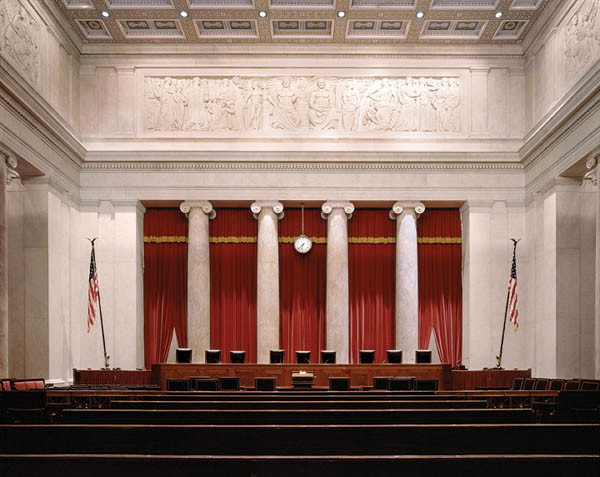The final briefs in former President Donald Trump’s latest case at the Supreme Court have been submitted related to a former president’s immunity from criminal prosecution from acts taken while in office.
 Back on March 12, 2024, Constitution Daily reported on the initial briefs in Trump v. United States after the Supreme Court took the case on Feb. 28, 2024. The final brief from Special Counsel Jack L. Smith (as the respondent) was filed on April 8, 2024, and the reply from former President Trump (as the petitioner) was filed on until April 15, 2024. They will likely foreshadow parts of the arguments presented at the Court on April 25, 2024.
Back on March 12, 2024, Constitution Daily reported on the initial briefs in Trump v. United States after the Supreme Court took the case on Feb. 28, 2024. The final brief from Special Counsel Jack L. Smith (as the respondent) was filed on April 8, 2024, and the reply from former President Trump (as the petitioner) was filed on until April 15, 2024. They will likely foreshadow parts of the arguments presented at the Court on April 25, 2024.
The briefs focused on the issues of what constitutes an official act of a president; which acts are within the president’s official duties; and what is the extent of liability of former presidents to criminal prosecution for conduct occurring while in office.
The argument from Special Counsel Smith
In the Trump immunity case (as opposed to Trump v. Anderson, which concerned state-level attempts to remove Trump from the ballot, which the court ruled violated the Constitution), a federal grand jury indicted Trump on several charges related to his actions after the 2020 presidential election: conspiring to defraud the United States; corruptly obstructing the certification of the presidential election results on Jan. 6, 2021; and conspiring to violate one or more person’s constitutional right to vote and have one’s vote counted. On Feb. 6, 2024, the U.S. Court of Appeals for the D.C. Circuit ruled that Smith could move forward with a trial. On Feb. 28, the Supreme Court granted a stay of that decision, and accepted review of the case.
Trump has sought for the indictments to be dismissed on the grounds that he enjoys absolute immunity from criminal prosecution for acts taken within his official responsibilities as president. But in his submissions to the Court, Smith disputes that Trump cannot claim immunity for several reasons. “The president’s constitutional duty to take care that the laws be faithfully executed does not entail a general right to violate them,” Smith argues. This same argument was made in his brief filed before the Court’s stay.
Smith is also repeating a similar argument from his initial briefs about Fitzgerald v. Nixon, a Supreme Court decision from 1982 involving a civil lawsuit brought against government officials. In that 5-4 majority opinion, Justice Lewis Powell said that former President Richard Nixon was “entitled to absolute immunity from damages liability predicated on his official acts.” Smith argues that precedent, however, does not apply to federal criminal prosecutions.
Smith also makes a similar argument from his prior brief that courts are able to hold a former president accountable for violating federal laws. “Even if this Court holds that a former president is entitled to some immunity from criminal prosecution for official acts, that principle does not preclude trial on this indictment,” Smith believes. “The indictment describes petitioner’s efforts to ‘remain in power despite losing the 2020 election.’ The severity, range, and democracy-damaging nature of the alleged crimes are unique in American history,” Smith concludes.
The reply from former President Trump
When the former president’s attorneys sought a stay of the decision from the U.S. Supreme Court. the petition focused on the idea Trump had undertaken official acts “performed within the ‘outer perimeter’ of his official responsibility,” quoting Justice Powell’s opinion in Fitzgerald.
“The Special Counsel invokes the procedural protections of the criminal process. But safeguards against meritless claims in civil cases, though somewhat less robust, are still formidable, yet Fitzgerald upheld absolute immunity in that context,” the brief states.
Trump also makes numerous arguments about precedents dating back to the Constitution’s founding era about the unique role of the executive. His legal team is continuing with a core argument that the landmark Marbury v. Madison (1803) decision held that all courts created under the Constitution lack the power to consider a president’s official discretionary acts. “The Special Counsel has no plausible answer to Marbury,” he claims.
The reply also continues the argument that Trump cannot be tried for the alleged Jan. 6 acts since the matter was considered during his Senate impeachment proceedings. “The Impeachment Judgment Clause thus reinforces Marbury’s immunity principle. Absent the exception recognized in the Clause—impeachment and Senate conviction—a president’s official acts ‘can never be examinable by the courts,’” the brief states, citing Marbury.
Trump also cites various historical sources as supporting the independence of the executive from partisan efforts. “Gouverneur Morris stated that, for his official acts, the president ‘should be punished not as a man, but as an officer, and punished only by degradation from his office,’” says Trump, in a quote attributed to the final debates at the Constitutional Convention in 1787.
Another authority cited is James Madison’s writing on partisanship in Federalist 10. “[T]his propensity of mankind to fall into mutual animosities” will “kindle their unfriendly passions and excite their most violent conflicts,” the brief quotes from Madison’s essay. Trump concludes that “the radical innovation of prosecuting a former president for official acts will fulfill those ominous prophecies.”
Arguments on April 25, 2024, will begin at 10 a.m. EDT and likely conclude in the late morning. Live audio of the arguments can be heard on the Supreme Court’s website at https://www.supremecourt.gov.
Related Content from the National Constitution Center
Podcast: Is President Trump Immune From Prosecution?
Blog: Explaining the Trump immunity case at the Supreme Court
Scott Bomboy is editor in chief of the National Constitution Center.






